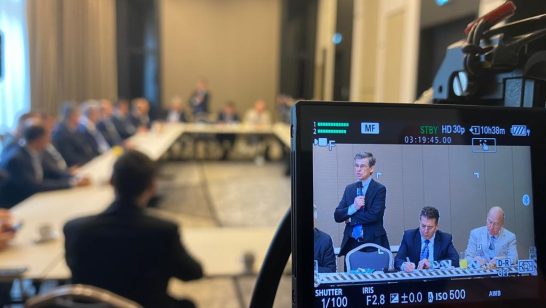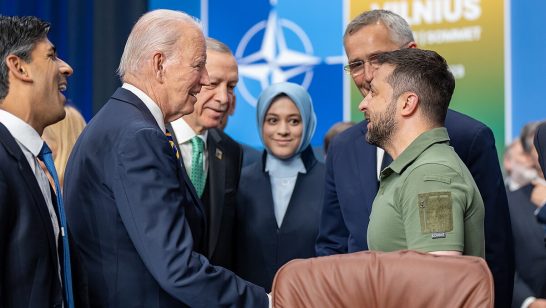
The EU’s rejection to formally open accession negotiations with Albania and North Macedonia is not as worrying as its core implication: the EU is unable to fulfil promises, even when countries make unpopular decisions on the basis of such promises. In October 2019, France used an “It’s not you; it’s me” justification to veto the decision, arguing that the EU needs to overhaul the existing membership process and then open negotiations with candidate countries. Unlike France, Germany is keen to award the reformers, which leaves Albania and North Macedonia with room for hope that France might agree to open the door for them soon. The EU’s rejection of Albania and North Macedonia has not only made Serbia’s flirting with Russia look reasonable, but it has also reduced the prospects for a Kosovo-Serbia peace treaty in the foreseeable future.
With the EU blessing and Macron’s open encouragement, in September 2018, North Macedonia ran a referendum to change the country’s name in return for formally opening EU accession talks. For many, undergoing such a process is not only difficult, but also potentially humiliating. Starting in 2014, Albania underwent an aggressive judicial reform under EU terms. Even though a formal decision to start membership talks is more of a gesture than a tangible action—think how Turkey started negotiations 14 years ago and it might never join the bloc—the EU was still unable to extend something even intangible for the tangible actions of both North Macedonia and Albania. The French position is considered a stab in reformers’ back and likely to strengthen the position of populist and Russian- or Turkish-leaning politicians in the Western Balkans.
Following the decision, last month France produced a non-paper that proposes an overhaul of the accession process. The proposal primarily focuses on pro-forma changes rather than anything substantive. A major change involves greater involvement of the Council, EU’s political wing, in different stages of the accession process. Shifting power from the European Commission to the Council only gives EU member states the opportunity to inject subjective criteria, reversing the membership process even when the European Commission confirms fulfilment of technical criteria. Any reform to the accession process should aim for more objectivism and predictability in the process, rather than subjectivity and insecurity.
The accession process should be improved through the introduction of measurable metrics for criteria fulfilment. Even when the European Commission concluded that pre-agreed criteria had been fulfilled, there have been cases when individual member states questioned the European Commission’s conclusions and directly asked candidate states for more tests or even more criteria.
For example, the European Commission concluded that Kosovo had met all the requirements for visa free travel in the Schengen area. However, Germany still asked Kosovo to establish a bilateral working group so that Germany can conduct its own assessment and, if necessary, introduce additional requirements before deciding whether to vote in favour of visa free travel for Kosovo. When individual member states disempower the European Commission, they harm the EU’s institutional credibility and its power to push for reforms among candidate states.
Member States tend to propose more tests or criteria to satisfy populist opinions based on prejudice at the expense of European Commission conclusions based on evidence. Alexander Soros, Deputy Chair of the Open Society Foundations, tweeted that the EU’s rejection of Albania and North Macedonia, which has a large Albanian population, is due to Europe’s “prejudice and bigotry towards ethnic Albanians.” EU decisions that are clouded by populism at home serves to benefit populist and anti-EU politicians in the Western Balkans, who stand ready to toy with the emotions of their disillusioned citizens.
Unlike North Macedonia and Albania, which are less prone to Russian influence, Serbia’s closer ties with Russia forced the EU to accelerate its EU membership path. The call to rethink enlargement also impacts Serbia’s EU membership and, ironically, it makes Serbia’s recent free trade agreement with the Eurasian Economic Union look reasonable. As Serbian PM stated, “We need to take care of ourselves.” In the new enlargement context, the EU has weakened its own credibility in keeping Serbia in check as it bonds further with Russia.
The EU decision will also keep Kosovo further away from the EU. If Serbia does not believe that it will join the EU soon, it will delay a settlement with Kosovo. This is because, in the absence of a peace treaty Kosovo is unable to embark on the accession journey. The peace treaty condition applies differently to Serbia than to Kosovo because five EU members—Cyprus, Greece, Romania, Slovakia, and Spain— do not recognise Kosovo’s statehood. For Serbia the accession process cannot conclude without a deal with Kosovo, whereas for Kosovo the accession process cannot begin without a deal with Serbia.
The asymmetry in timelines for Serbia and Kosovo to fulfil this condition does not prevent Serbia from getting closer to EU membership but it also incentivises Serbia to delay an agreement with Kosovo, to keep Kosovo further away from EU membership. This asymmetry in EU integration timelines for Serbia and Kosovo encourages Serbia to become a “false negotiator,” keeping the negotiation process alive without an intention to reach an agreement up until the last stage of its EU integration process. If Serbia’s EU integration gets delayed, this also means a delay for the peace treaty.
Candidate states that are closer to EU membership are also considered more stable and democratic by virtue of having undertaken greater reforms. The eventual divergence of Serbia and Kosovo in their EU integration paths would turn Serbia into a more reliable partner vis a vis the EU and, as such, it would weaken Kosovo’s leverage for reaching a favourable deal with Serbia. Even though it’s in Kosovo’s interest to reach a deal without delay, it’s in Serbia’s interest to maintain asymmetrical EU integration timelines vis a vis Kosovo.
For Serbia, the EU decision only legitimises Serbia’s double-dipping in EU and Russian spheres. Kosovo—facing isolation due to a peace treaty delay—should undertake half measures to circumvent political barriers posed to its EU membership path. In July 2018, I wrote about Kosovo’s prospects of joining the European Economic Area (EEA) through the European Free Trade Association (EFTA) as an alternative to the EU. EFTA is a club consisting of four countries that recognise Kosovo: Iceland, Lichtenstein, Norway, and Switzerland. The five EU non-recognisers generally show no sustained resistance in cooperating with Kosovo on economic grounds and, as a result, they are less likely to resist Kosovo’s proximity with the EU via EFTA. For example, all five non-recognisers were behind the EU’s consensus policy in offering a Stabilisation and Association Agreement to Kosovo, an agreement that in principle is a free trade deal between the EU and Kosovo. Joining the EFTA as an interim measure strengthens Kosovo’s sovereignty vis a vis the EU and ensures that Kosovo’s proximity with the EU does not need to run through Serbia.
The original argument for Kosovo to join the EEA through the EFTA as an interim measure was posited in the context of ensuring that Kosovo does not get isolated as other Western Balkans countries move closer to the European Union. The EU’s rejection of Albania and North Macedonia has made the same argument applicable to the entire Western Balkans. Following the EFTA model as an interim measure has also been recently proposed by the European Stability Initiative.
Regardless of the EU’s next steps, or available alternatives to EU membership for the Western Balkans, the EU’s lack of unity on enlargement policy— even in the case of a formal decision that would not have had any immediate effects on enlargement—shows the EU’s power not only to stabilise, but also to destabilise its backyard and turn it into a playground for its opponents.
The opinions articulated above represent the private views of the author, and do not necessarily reflect the position of the organisation he works for, or of the European Leadership Network or any of the ELN’s members. The ELN’s aim is to encourage debates that will help develop Europe’s capacity to address the pressing foreign, defence, and security challenges of our time.



